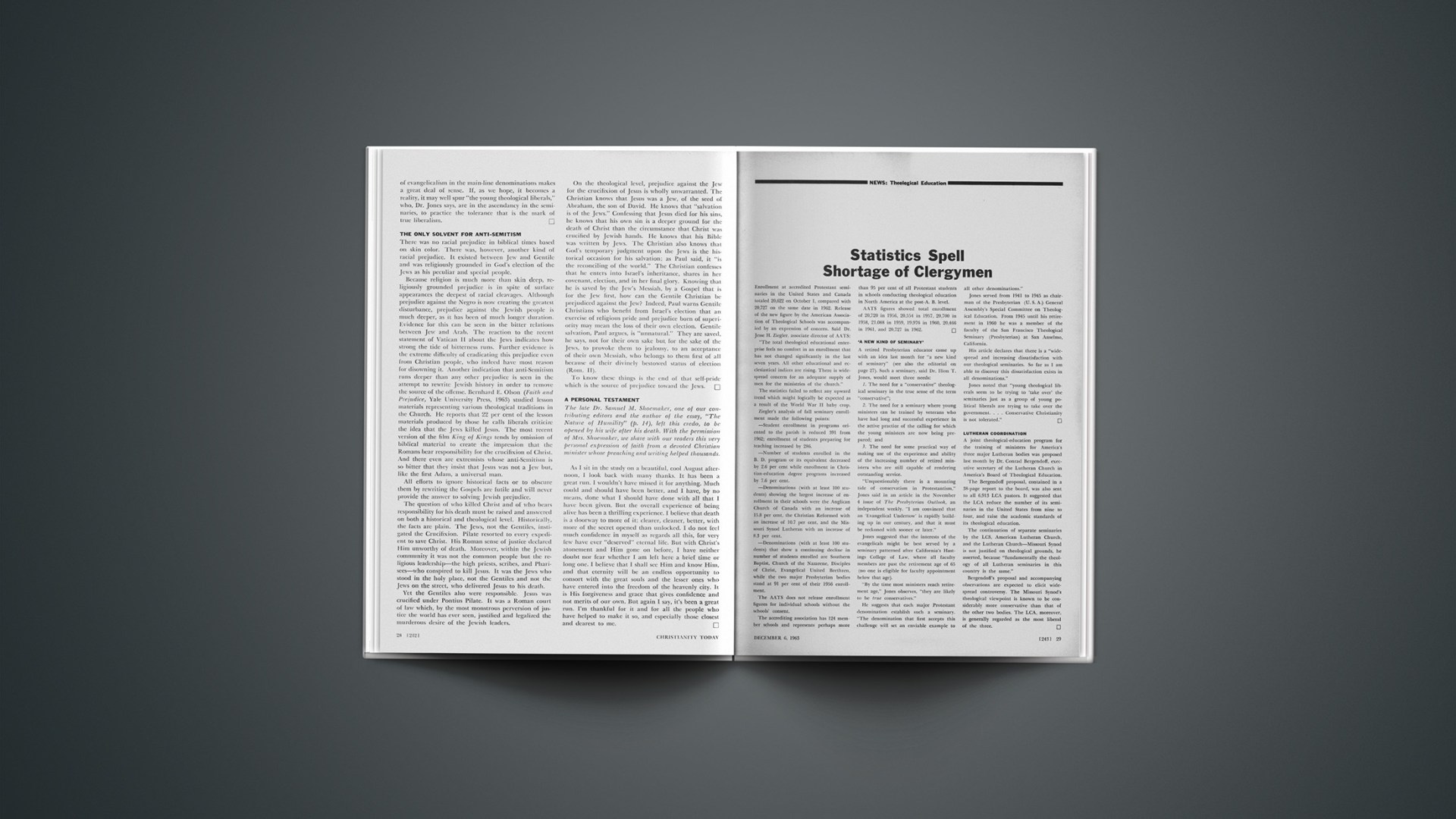Enrollment at accredited Protestant seminaries in the United States and Canada totaled 20,622 on October 1, compared with 20,727 on the same date in 1962. Release of the new figure by the American Association of Theological Schools was accompanied by an expression of concern. Said Dr. Jesse H. Ziegler, associate director of AATS:
“The total theological educational enterprise feels no comfort in an enrollment that has not changed significantly in the last seven years. All other educational and ecclesiastical indices are rising. There is widespread concern for an adequate supply of men for the ministries of the church.”
The statistics failed to reflect any upward trend which might logically be expected as a result of the World War II baby crop.
Ziegler’s analysis of fall seminary enrollment made the following points:
—Student enrollment in programs oriented to the parish is reduced 391 from 1962; enrollment of students preparing for teaching increased by 286.
—Number of students enrolled in the B. D. program or its equivalent decreased by 2.6 per cent while enrollment in Christian-education degree programs increased by 7.6 per cent.
—Denominations (with at least 100 students) showing the largest increase of enrollment in their schools were the Anglican Church of Canada with an increase of 15.8 per cent, the Christian Reformed with an increase of 10.7 per cent, and the Missouri Synod Lutheran with an increase of 8.3 per cent.
—Denominations (with at least 100 students) that show a continuing decline in number of students enrolled are Southern Baptist, Church of the Nazarene, Disciples of Christ, Evangelical United Brethren, while the two major Presbyterian bodies stand at 91 per cent of their 1956 enrollment.
The AATS does not release enrollment figures for individual schools without the schools’ consent.
The accrediting association has 124 member schools and represents perhaps more than 95 per cent of all Protestant students in schools conducting theological education in North America at the post-A. B. level.
AATS figures showed total enrollment of 20,720 in 1956, 20,554 in 1957, 20,700 in 1958, 21,088 in 1959, 19,976 in 1960, 20,466 in 1961, and 20,727 in 1962.
‘A New Kind Of Seminary’
A retired Presbyterian educator came up with an idea last month for “a new kind of seminary” (see also the editorial on page 27). Such a seminary, said Dr. Ilion T. Jones, would meet three needs:
1. The need for a “conservative” theological seminary in the true sense of the term “conservative”;
2. The need for a seminary where young ministers can be trained by veterans who have had long and successful experience in the active practice of the calling for which the young ministers are now being prepared; and
3. The need for some practical way of making use of the experience and ability of the increasing number of retired ministers who are still capable of rendering outstanding service.
“Unquestionably there is a mounting tide of conservatism in Protestantism,” Jones said in an article in the November 4 issue of The Presbyterian Outlook, an independent weekly. “I am convinced that an ‘Evangelical Undertow’ is rapidly building up in our century, and that it must be reckoned with sooner or later.”
Jones suggested that the interests of the evangelicals might be best served by a seminary patterned after California’s Hastings College of Law, where all faculty members are past the retirement age of 65 (no one is eligible for faculty appointment below that age).
“By the time most ministers reach retirement age,” Jones observes, “they are likely to be true conservatives.”
He suggests that each major Protestant denomination establish such a seminary. “The denomination that first accepts this challenge will set an enviable example to all other denominations.”
Jones served from 1941 to 1945 as chairman of the Presbyterian (U. S. A.) General Assembly’s Special Committee on Theological Education. From 1945 until his retirement in 1960 he was a member of the faculty of the San Francisco Theological Seminary (Presbyterian) at San Anselmo, California.
His article declares that there is a “widespread and increasing dissatisfaction with our theological seminaries. So far as I am able to discover this dissatisfaction exists in all denominations.”
Jones noted that “young theological liberals seem to be trying to ‘take over’ the seminaries just as a group of young political liberals are trying to take over the government.… Conservative Christianity is not tolerated.”
Lutheran Coordination
A joint theological-education program for the training of ministers for America’s three major Lutheran bodies was proposed last month by Dr. Conrad Bergendoff, executive secretary of the Lutheran Church in America’s Board of Theological Education.
The Bergendoff proposal, contained in a 38-page report to the board, was also sent to all 6,913 LCA pastors. It suggested that the LCA reduce the number of its seminaries in the United States from nine to four, and raise the academic standards of its theological education.
The continuation of separate seminaries by the LCS, American Lutheran Church, and the Lutheran Church—Missouri Synod is not justified on theological grounds, he asserted, because “fundamentally the theology of all Lutheran seminaries in this country is the same.”
Bergendoff’s proposal and accompanying observations are expected to elicit widespread controversy. The Missouri Synod’s theological viewpoint is known to be considerably more conservative than that of the other two bodies. The LCA, moreover, is generally regarded as the most liberal of the three.










